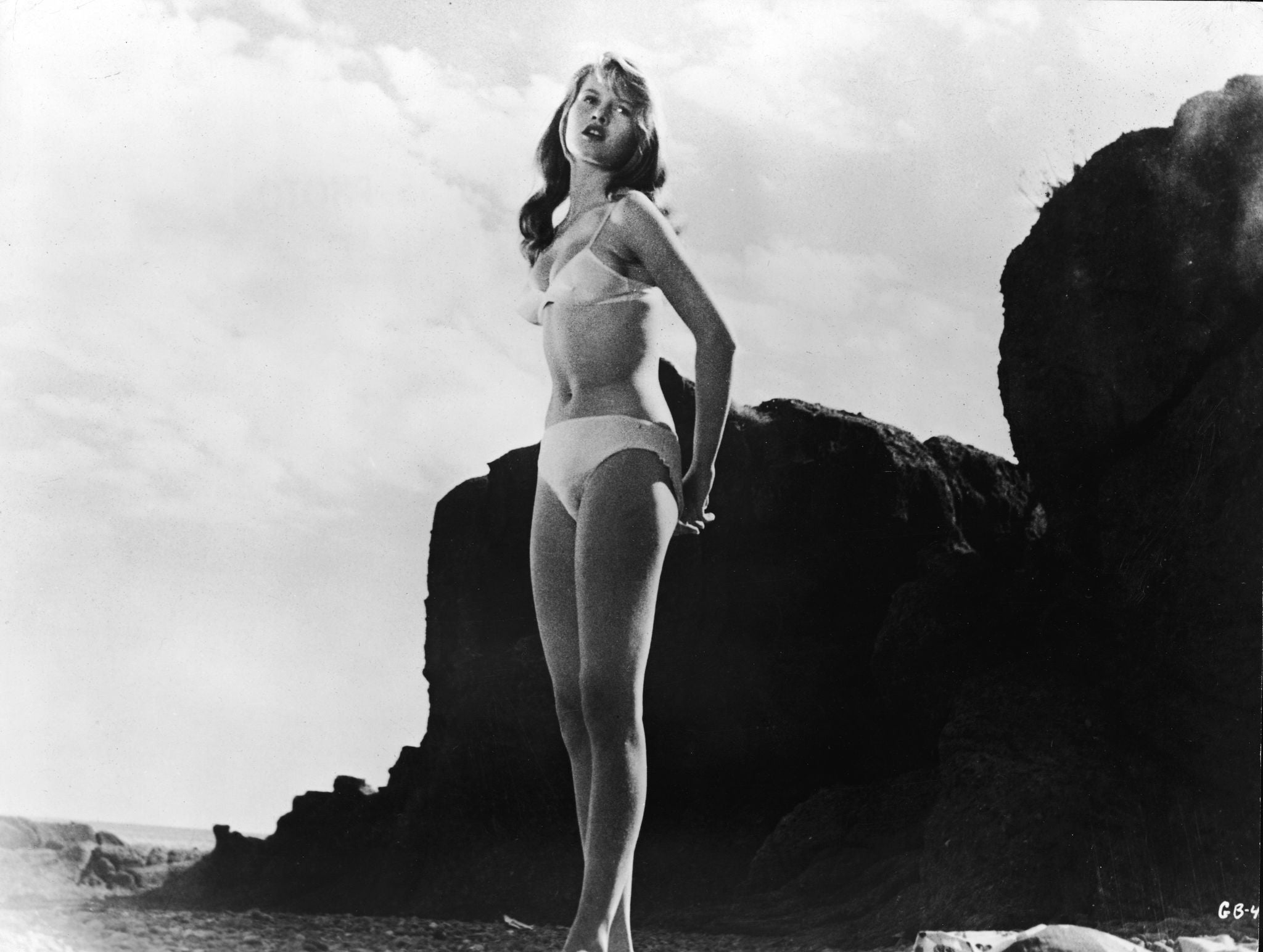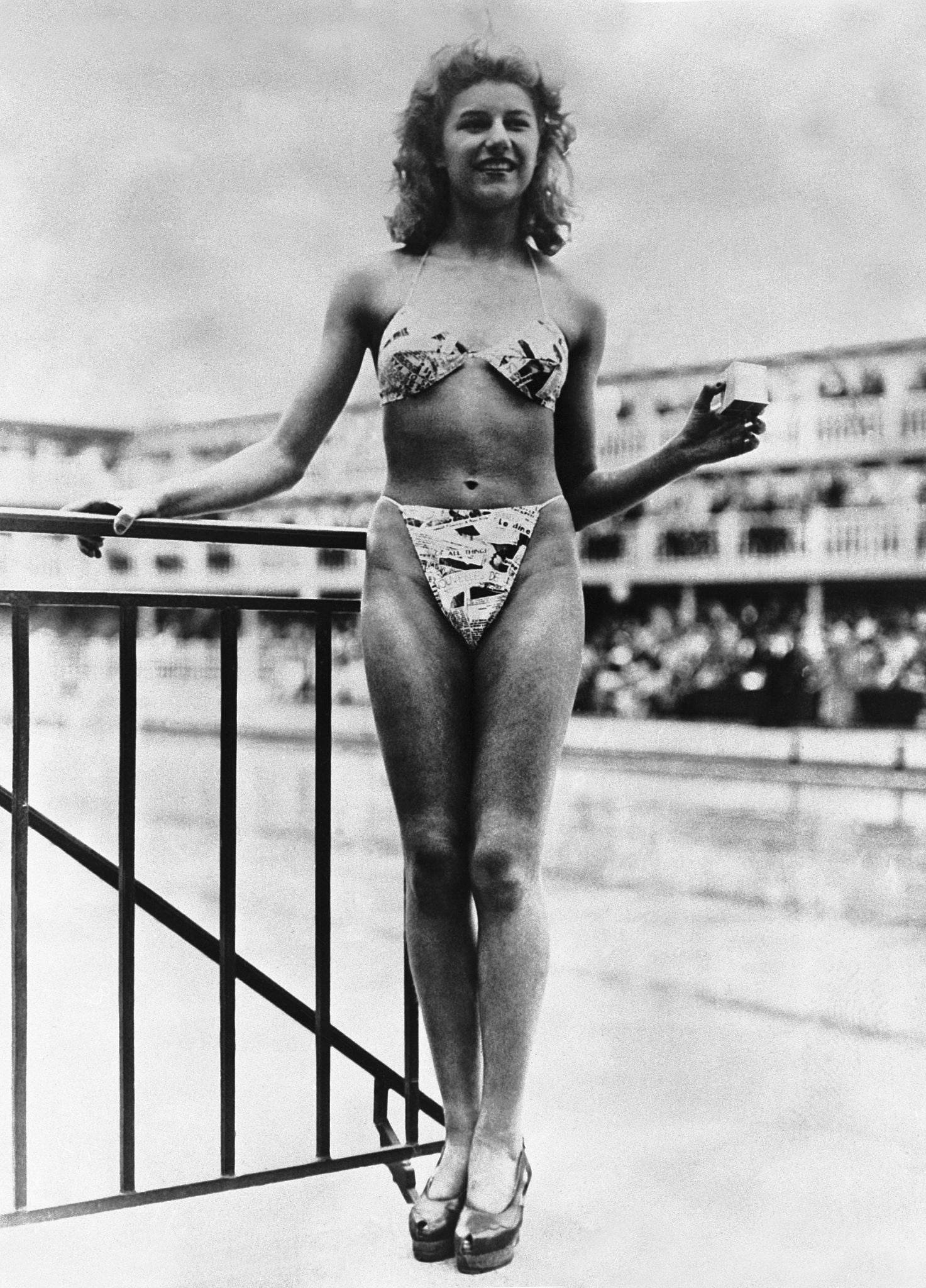It's 2023 and America Still Can't Figure Out Whether Bikini Modeling is Empowering or Sexist
 Hulton Archive. Getty Images.
Hulton Archive. Getty Images.This is a publicity photo of legendary French sex symbol Brigitte Bardot, from a film in which the title gives away the entire plot, The Girl in the Bikini. I don't know for sure, but given the fact it came out in 1952, it was probably scandalous for its time, in the United States at least. The sort of movie that a vet coming back from Korea had to sneak into by himself, while taking his best gal to watch Gene Kelly dance around the Eiffel Tower or whatever.
I bring it up because that was over 70 years ago, and our culture still hasn't settled on what our attitude is supposed to be toward women in bathing suits. Even though the bikini itself goes way further back than even the early 50s, according to the only trusted source on the internet:
Wikipedia - Evidence of bikini-style women's clothing has been found as early as 5600 BC, and the history of the bikini can be traced back to that era. Illustrations of women wearing bikini-like garments during competitive athletic events in the Roman era have been found in several locations, the most famous of which is at Villa Romana del Casale.
Although two-piece bathing suits were being used by women as early as the 1930s, the bikini is commonly dated to July 5, 1946, when, partly due to material rationing after World War II, French engineer Louis Réard introduced the modern bikini, modeled by Micheline Bernardini.
 Bettmann. Getty Images.
Bettmann. Getty Images.So that puts us 7,600 years since the first two-piece suits, and somewhere between 75-100 years since they were re-introduced to modern society. And yet we're still debating their nature.
Depending on the circumstances, who's wearing it, and whose eyes are beholding it, a woman in a bathing suit is either a dehumanized, objectified victim of the male gaze, or an empowered, body-positive She Boss, tearing down the patriarchy with her fearless confidence. Those are two very different goalposts that are not only super duper far apart, they're being moved constantly.
So I guess you can consider me confused. I'll explain with examples.
There's not a person who worked at Barstool back in the early days who won't confirm just how much adding cover models to the old print edition and then Uncle Buck's "Wake Up With …" celebrity photo gallery and Dave Portnoy's "Local Smokeshow" posts helped grow the brand. The Smokeshow blogs in particular resonated with the audience, since the photos they submitted were authentic and genuine, as opposed to the highly retouched ones filling the pages of magazines like Maxim in the mid-2000s.
And I can't stress enough the words "they submitted." Because these women wanted to be featured on the Stool. Dave wasn't copy & pasting the pictures out of the Instagram pages of unsuspecting women or posting them without express, written permission. But you wouldn't have known that from the withering fire Barstool took from angry crusaders trying to shut us down with charges of sexism. Their argument being, I suppose, that these women are old enough to vote, but that doesn't mean they have the right to do what they want with their own bodies.
That was well over a decade ago, and still we haven't come any closer to figuring out where the line of scrimmage between Sexism and Female Empowerment is. For more recent examples, consider the news of the past couple of weeks surrounding the SI Swimsuit Issue.
When it was announced Livvy Dunne was going to appear, she was accused of personally setting back the cause of female equality:
But when it was announced her contemporary college athlete Angel Reese would be joining her? Crickets:

Followed soon thereafter by the news that a geriatric Martha Stewart was going to grace the cover:
And that was met by universal acclaim. Stewart is being hailed as a heroic figure, inspiring women to be the best versions of themselves. Proving by her example that even 81-year-olds who've served prison stretches can look good in designer swimwear fashion.
But at the exact same time all this positivity was happening, this video resurfaced. This is from Miller Lite and was released to celebrate Women's History Month. Where Ilana Glazer explains women were the first to brew beer and have been doing it throughout history, but then were rewarded for their efforts by being put into bikinis in ads for … Miller Lite:
I can't speak to whether or not women were doing most of the heavy lifting when it came to brewing going back to antiquity. I can confirm that beer goes all the way back to the oldest work of great literature we have, The Epic of Gilgamesh, where it's referred to as the drink of "the civilized man." But maybe those Mesopotamian sexists were just sitting around the palace firing down Double IPAs while the ladies were doing all the harvesting, grinding, simmering and fermenting. I'll defer to Miller's expertise on that point.
Nor do I have a problem with them wanting to recycle old paper products into fertilizer. It sounds like a great use of a resource. Taking beer ads and grinding them into something that will produce more beer sounds like a Lion King-level circle of life thing. Beautiful in its own way.
The problem I'm having is the question of why beer ads featuring bikini clad women are "shit." To use the metaphor from a few paragraphs ago, where is the line of scrimmage? How are we supposed to know when a published photo of an adult female in a bathing suit is onside, offside, or lined up in the neutral zone? Livvy Dunne is setting women back, Angel Reese isn't, and Martha Stewart is moving their cause forward? Is that it? I get that it's a subject topic and there's a lot gray area. But this is just confusing. After all, it wasn't that long ago that Lena Dunham was being hailed for her courage every time she went naked on HBO by some of the very same people who found it objectionable and gratuitous every time Emilia Clarke did it.
Is the popular culture trying to say whether or not it's OK to show skin depends on how much people want to see you show skin? Because then who decides what's acceptable and what's objectionable? NCAA coaches? The NY Times? The people who spent years trying to get Barstool deleted from the internet? I don't know if beer companies are our moral compasses on this issue, since they've been using sex appeal to sell their brands since the time of Gilgamesh. And it worked. It's a natural human instinct to be drawn to attractive people looking their best. Those ads appealed to men and women both. And if they want to turn them into mulch or whatever in order to help female farmers, more power to them. But there's just zero need to apologize for bikinis in movies, sports comedy sites, magazines, or advertisements.
Personally for me, it all comes down to what the legendary Spinal Tap said decades ago. There's a fine line between clever and stupid.


